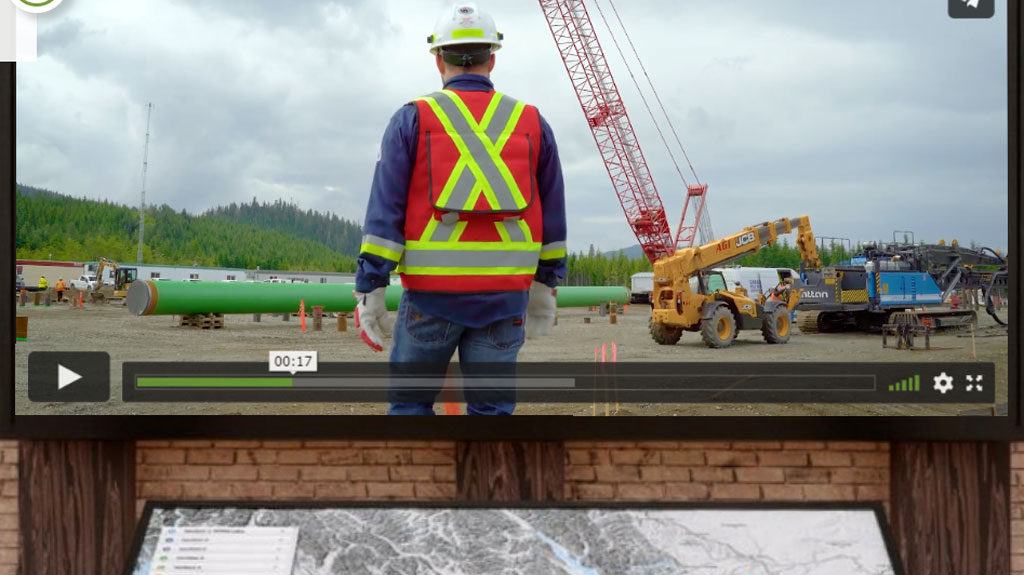Coastal GasLink is making use of digital technology to showcase its 670-kilometre-long natural gas pipeline project in B.C. to local and Indigenous communities along the route.
The company has developed a virtual open house platform that can be accessed via a computer or cellphone.
The platform allows people to get information and project updates, view photos and watch videos about construction, environmental and safety considerations, local contracting and employment on the project. There is also an interactive project map, a video flyover of the route and stations where visitors can engage with subject matter experts.
“Coastal GasLink typically hosts in-person public information sessions annually, but as a result of the ongoing COVID-19 pandemic and limits on indoor gathering size, in-person engagement remains limited,” explains Kiel Giddens, public affairs manager at Coastal GasLink for B.C.
“Given we are unable to gather over a cup of coffee in local community halls, connecting and engaging with local communities is more important than ever. This is why Coastal GasLink developed our first virtual open house to engage with Indigenous and local communities along our project route.”
Construction is progressing on all eight sections, with eight million hours of work completed and 140 kilometres of pipe installed. The project is expected to take three years to complete.
The pipeline’s route begins in Dawson Creek and crosses through the Canadian Rockies and other mountain ranges to Kitimat, where the gas will be exported to Asian customers.
Giddens says the company didn’t want the COVID-19 pandemic to stop it engaging with communities along the route, so the team looked for an alternate solution.
“Community engagement is important to our Coastal GasLink Indigenous and local community partners,” he says. “This virtual open house is a tool that supports our ability to keep our stakeholders and the general public informed of project activities and supports our commitments related to public engagement.”
The platform features a feedback form for users to complete a survey and submit questions and comments directly to the Coastal GasLink team.
Coastal GasLink conducts regular aerial monitoring of its right-of-way and the company has also provided a short summary of aerial footage on the platform to allow the general public a view of the project from above.
The virtual open house was launched in April. It took about 14 weeks for the content to be created for the site. Since the launch date, there have been more than 22,000 users on the site.
“Through our regular engagement, we have a good understanding of the information and content that is important to communities along our project route,” explains Giddens. “The majority of the content exists on our Coastal GasLink website. Our communications team has developed some incredible video content, and the virtual open house is a new way of presenting and sharing our many communications assets.
“We added subject matter expert photos and audio recordings to share their work history and experience on the Coastal GasLink project.”
In building the platform, the company drew on its experience with a virtual open house developed for the TC Energy 2021 NGTL System Expansion Project, a plan to construct and operate 344 kilometres of 48-inch diameter pipeline, a control valve and three 30-megawatt compressor station unit additions in western Alberta.
The company says COVID-19 initially threw a wrench into the works of its public engagement plans but it also spurred new ways of connecting with communities.
“Our stakeholder engagement program has changed significantly since the start of COVID-19, and virtual meetings are now standard,” says Giddens. “Coastal GasLink has sponsored and participated in many virtual events, such as conferences and annual general meetings, since the outset of the COVID-19 pandemic.”
Giddens says Coastal GasLink is gearing up for an important summer construction season now that the B.C. Supreme Court has rejected a bid to quash the extension of the environmental assessment certificate for the natural gas pipeline at the centre of countrywide protests in February last year.
The Office of the Wet’suwet’en, a society governed by several hereditary chiefs, had asked the court to send the certificate back to B.C.’s Environmental Assessment Office for further review because that office did not address the findings of the 2019 report from the National Inquiry into Missing and Murdered Indigenous Women and Girls when it approved the extension. However, Justice Barbara Norell disagreed, saying it’s clear that the inquiry’s findings were considered.
“Over the summer, our field workforce will ramp up, accelerating the build phase and implementing our construction plans,” Giddens says. “Construction has continued to advance, including the recent 100-per-cent completion of clearing in Sections 1 and 2 and the delivery of 692 kilometres of pipe across the project route without any safety incidents.
“Through efforts on our 2021 scheduling and planning, we remain on track to bring the pipeline into service in 2023.”











Why was this pipeline even able to be built?! What did I miss here? I thought this was being protested greatly. Who allowed rbis decision to be made??